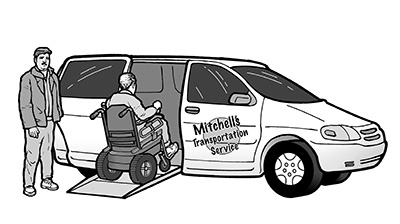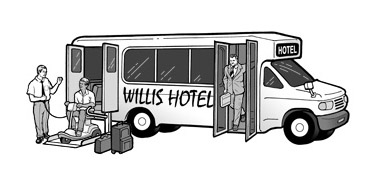






 Transportation as a convenience for customers
Transportation as a convenience for customers
Some businesses provide transportation for their customers as a convenience that supports their primary business. Examples include hotels that provide courtesy shuttle vans for guests going to or from an airport or other local destinations; tourist attractions or shopping malls that offer shuttle service to move visitors around the site; stadium owners or operators who offer their fans shuttle service between the stadium and the parking lots; and colleges that provide campus transportation services. Companies that provide services like these must offer transportation to people with disabilities.
Equivalent service
Companies that provide transportation services on demand (such as a hotel that sends a van to an airport to pick up a customer when the customer calls the hotel) can acquire vehicles that are equipped with a lift or can contract with another company to provide accessible service for the customers who need it. For example, a small hotel might hire a local transportation company that has a lift-equipped van to transport a hotel guest who uses a wheelchair.
The important thing to remember is that the service provided must be equivalent. If customers without disabilities can get transportation quickly and easily, people with disabilities deserve equivalent service. The services offered to people with disabilities must be as convenient as the services offered to other people in terms of fares, schedules or response times, hours of operation, pick-up and drop-off locations, and other measures of equivalent service.

A small hotel has hired a transportation company with a lift-equipped van
to transport a hotel guest who uses a wheelchair.
Accessible vehicles
The rules are slightly different for companies that provide courtesy transportation on a fixed route (such as a hotel that runs a shuttle bus continuously to and from an airport). In this case, all vehicles purchased or leased since 1992 with a capacity of over sixteen people must be equipped with a lift. Vehicles purchased or leased since 1992 with a smaller capacity must also be equipped with a lift, unless the company provides equivalent service as described above.

A larger hotel has purchased a lift-equipped bus to transport hotel guests. A man using a scooter is using the lift to exit the bus.
These rules apply to companies not primarily engaged in the business of transporting people.
|
|
|
|
|
|







